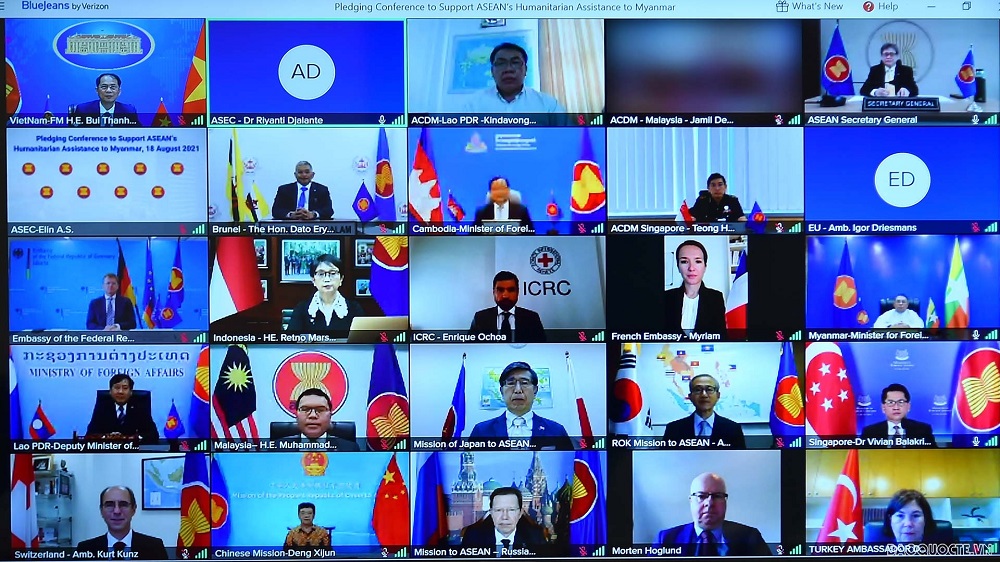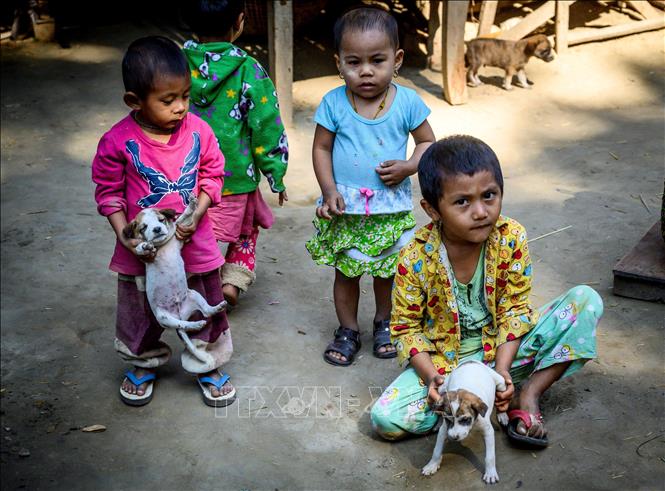ASEAN’s 1st humanitarian batch to arrive in Myanmar late August
The humanitarian assistance will be delivered in two stages, with an aim to help locals “stabilize” their lives.
The first humanitarian batch of Covid-19 vaccine and medical equipment, contributed by ASEAN member states is scheduled to arrive in Myanmar before August 31.
The news was released at a conference to seek support for the ASEAN’s Humanitarian Assistance to Myanmar held via video links on August 18 with the attendance of ASEAN foreign ministers and ASEAN’s partners like China, EU, France, Japan, Germany, Russia, South Korea, and Switzerland.
At the conference, ASEAN countries and partners were committed to providing an amount of US$9 million worth of goods and cash to Myanmar.
Vietnam's Foreign Minister Bui Thanh Son attended the event and announced Vietnam's initial medical equipment support worth $100,000 to this country.
At the event, the ASEAN Secretariat and the ASEAN Coordinating Center for Humanitarian Assistance on Disaster Management (AHA Center) said the Myanmar assistance will have two stages including “lifesaving” humanitarian aid, focusing on response to the Covid-19 pandemic; and implementing assistance measures to “stabilize life.”
Humanitarian support to Myanmar will be chaired by ASEAN, ASEAN Secretary-General and AHA will coordinate support sources from ASEAN countries, partners, and the international community, ensuring that the aid will be distributed in a timely, efficient, and transparent manner to the people of Myanmar.
ASEAN also established an ASEAN Coordinating Group in Yangon, Myanmar to supervise
and assist the coordination and transfer of medical support to the local people. In addition, ASEAN will conduct field studies on locals’ need to promptly make appropriate adjustments in the next implementation steps that are expected to take place in 2022.
In another move, on August 17, the UN Security Council (UNSC) convened for a private meeting on Myanmar to get updates on the situation in the country from briefers who are UN Secretary-General’s Special Envoy for Myanmar Christine Schraner Burgener, the UN’s Acting Humanitarian and Resident Coordinator Ramanathan Balakrishnan, and ASEAN’s Special Envoy to Myanmar who is Brunei’s Second Foreign Minister Erywan Yusof.
Speaking at the UNSC meeting, Ambassador Dang Dinh Quy, Vietnam’s Permanent Representative to the United Nations (UN), expressed concerns about the continuity of violence that triggered the ruin of offices and civilian infrastructure, and the third wave of Covid-19. He warned that if violence does not come to an end soon, efforts on dialogues and mediation will be seriously affected.
| Children in Lekkapin village, Myanmar. Photo: AFP/VNA |
Humanitarian assistance shows the first implementation of the Five-Point Consensus, an important peace initiative on Myanmar mandated by the ASEAN Leaders’ Meeting in Jakarta on April 24, that includes (1) an immediate cessation of violence and the exercise of utmost restraint; (2) dialogue among all parties concerned to seek a peaceful solution; (3) appoint a special envoy by ASEAN Chair to facilitate mediation in the dialogue process, with the assistance of the Secretary-General of ASEAN; (4) provide humanitarian assistance through the AHA Center; (5) special envoy and delegation shall visit Myanmar to meet with all parties concerned.
To support the mediation process in Myanmar, ASEAN on August 4 appointed a special envoy to Myanmar to “facilitate mediation of the dialogue process” with “all parties concerned” to seek a “peaceful solution in the interests of the people.”
The Myanmar coup taking place in February 2021 has left more than 1,000 civilian deaths so far, Reuters cited an official of the Assistance Association of Political Prisoners (AAPP) activist group, which has been recording killings by security forces.
AAPP secretary Tate Naing told Reuters that “The actual number of victims is much higher.”
According to the United Nations, six months after the coup, Myanmar’s political, rights and aid crisis is worsening.
“The situation in the country is characterized now by instability and a deteriorating socio-economic and security situation and to add to that we have a raging third wave of Covid-19,” the UN’s Acting Humanitarian and Resident Coordinator Ramanathan Balakrishnan in an exclusive interview with the UN News in late July.













